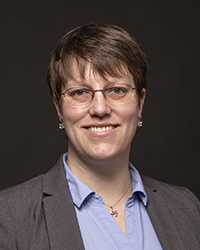Date/Time
Date(s) - 04/04/2022
9:35 am - 10:30 am
Location
New Engineering Building – Room 201
Categories
Sarah L. Perry, Ph.D.
Associate Professor
Department of Chemical Engineering
University of Massachusetts Amherst
Title: “Molecular Engineering Polyelectrolyte Complex Materials”
Abstract: Electrostatic interactions and polyelectrolyte complexation can be used in the self-assembly of a wide range of responsive, bioinspired soft materials ranging from dehydrated thin films, fibers, and bulk solids to dense, polymer-rich liquid complex coacervates, as well as more complex hierarchical structures such as micelles and hydrogels. This responsiveness can include swelling and dissolution or solidification, which can be harnessed to facilitate encapsulation and the subsequent fabrication of functional materials. In particular, we draw inspiration from biomolecular condensates, or membraneless organelles, which utilize liquid-liquid phase separation to create transient compartments in cells. These condensates are commonly formed due to weak, multivalent interactions involving intrinsically disordered proteins, and have been shown to enable the selective uptake of specific proteins, DNA/RNA, and small molecule drugs. We study how the patterning or presentation of charges and other chemical functionalities can modulate the potential for liquid-liquid phase separation via complex coacervation. We further examine how the distribution of charge on globular proteins can be used to facilitate selective uptake into coacervate phases, and how coacervate materials can be used to stabilize proteins and viruses against denaturation. This molecular-level understanding of polyelectrolyte complexation is further enhanced by detailed dynamic mechanical and thermodynamic examinations of the molecular nature of the various material transitions present in these systems. Our experimental efforts are supported by the parallel development of computational approaches for modeling and predicting the phase behavior of patterned polymeric materials. Our goal is to establish molecular-level design rules to facilitate the tailored creation of materials based on polyelectrolyte complexation that can both illuminate self-assembly phenomena found in nature, and find utility across a wide range of real-world applications.
Bio: Sarah L. Perry is an Associate Professor of Chemical Engineering at the University of Massachusetts Amherst. She received BS degrees in Chemical Engineering and Chemistry, as well as an MS degree from the University of Arizona, and a PhD in Chemical and Biomolecular Engineering from the University of Illinois at Urbana-Champaign. Sarah was also a postdoctoral fellow at the University of California Berkeley and the University of Chicago. Her research interests are highly interdisciplinary, and utilize self-assembly, molecular engineering, and microfluidic technologies to understand the fundamental principles behind materials design to inform solutions to real-world challenges. She has been recognized with a number of different teaching awards, along with the 3M Non-Tenured Faculty Award, and was a recipient of an NSF CAREER Award in 2020.

